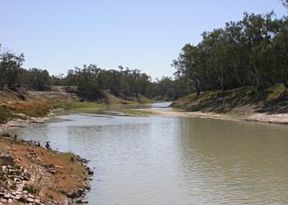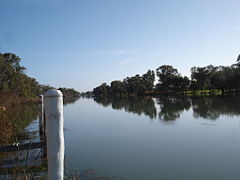Darling River
2008/9 Schools Wikipedia Selection. Related subjects: Geography of Oceania (Australasia)
| Darling River | |
|---|---|
| The Darling in unusually good condition, near Bourke | |
| Origin | Brewarrina |
| Mouth | confluence with the Murray River at Wentworth |
| Basin countries | Australia |
| Length | 2,739 km (1,701 mi) |
| Avg. discharge | 100m3/s |
The Darling River is the third longest river in Australia, flowing 1,390 km from northern New South Wales to its confluence with the Murray River at Wentworth, New South Wales. Some geographers treat the Barwon, MacIntyre, Darling and the lower Murray as a single river, 3,370km long, thereby making the Darling River the longest in Australia and one of the longest in the world. This is largely a matter of semantics.
Officially the Darling begins near Brewarrina at the confluence of the Culgoa and Barwon rivers, streams which rise in the ranges of southern Queensland. The whole Murray-Darling river system, one of the largest in the world, drains all of New South Wales west of the Great Dividing Range, much of northern Victoria and southern Queensland and parts of South Australia.
The Queensland headwaters of the Darling (the area now known as the Darling Downs) were gradually colonised from 1815 onward. In 1828 the explorer Charles Sturt was sent by the Governor of New South Wales, Sir Ralph Darling, to investigate the course of the Macquarie River. He discovered the Bogan and then, early in 1829, the upper Darling, which he named after the Governor. In 1835 Major Thomas Mitchell travelled the whole length of the Darling, confirming Sturt's earlier discovery that it was a tributary of the Murray.
Although its flow is extraordinarily irregular (the river dried up on no fewer than forty-five occasions between 1885 and 1960), in the later 19th century the Darling became a major transportation route, the pastoralists of western New South Wales using it to send their wool by shallow-draft paddle steamer from busy river ports such as Bourke and Wilcannia to the South Australian railheads at Morgan and Murray Bridge. But over the past century the river's importance as a transportation route has declined. In this period the Australian poet Henry Lawson wrote a well-known ironic tribute to the Darling River.
Today the Darling is in poor health, suffering from overuse of its waters, pollution from pesticide runoff and prolonged drought. In some years it barely flows at all. The river has a high salt content and declining water quality. To quote another Henry Lawson poem:
The skies are brass and the plains are bare,
Death and ruin are everywhere;
And all that is left of the last year's flood
Is a sickly stream on the grey-black mud;
The salt-springs bubble and the quagmires quiver,
And this is the dirge of the Darling River.—Henry Lawson

